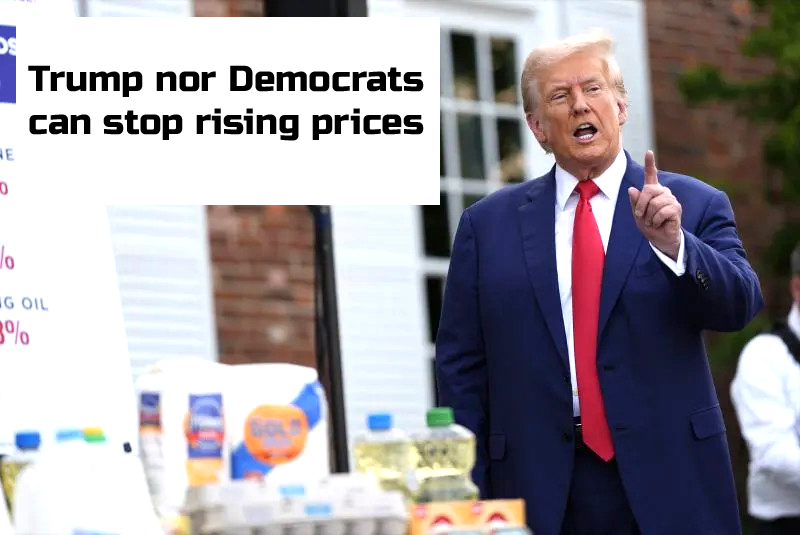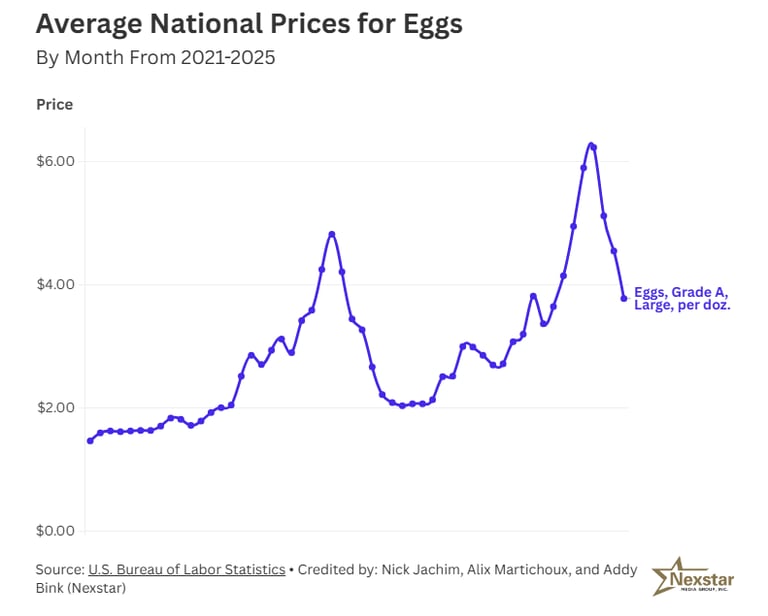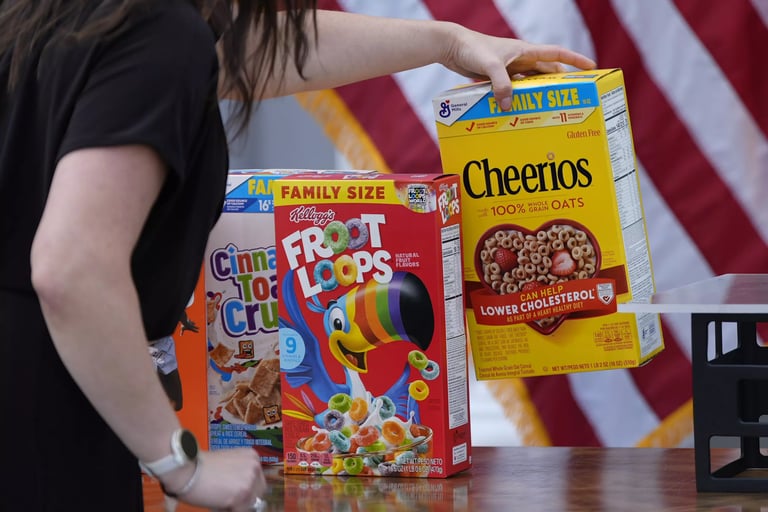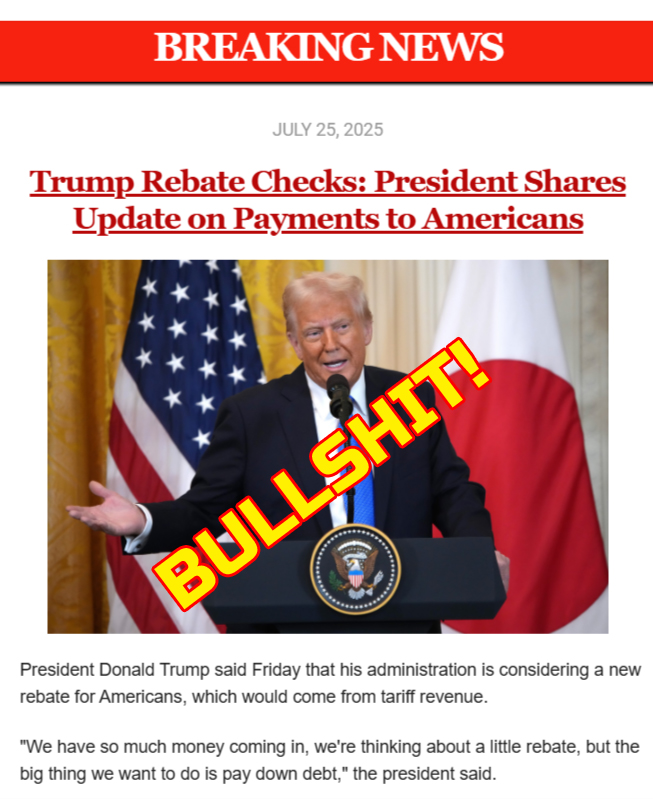Neither Democrats nor Republicans will ever solve the problem of rising grocery prices
Americans want to stabilize rising grocery prices and here's how we do it.
DailyBeastie.Com
8/11/20258 min read


Trump promised lower grocery prices ‘on Day One.’ Here’s what happened
(NEXSTAR) – Campaigning for office a year ago, standing in front of a table loaded up with bags of flour, cartons of eggs and gallons of milk, President Donald Trump told voters, “When I win, I will immediately bring prices down, starting on Day One.”
Unfortunately for him – and money-strapped Americans – it hasn’t worked out that way.
Nexstar employees around the country tracked a selection of grocery items over the past six months to see if prices would rise, fall or stay the same after Trump took office in January. Our observations, as well as federal data collected by the Bureau of Labor Statistics (BLS), show grocery prices overall have remained stubbornly high and even increased slightly.
The overall cost of food at home has ticked up between 0.2% and 0.4% almost every month since January, according to BLS tracking. One exception was in April 2025, when prices went down 0.1% from the month before. All those tiny increases have added up to a 3% increase in food prices year-over-year.
The situation at any given grocery store is more nuanced and varied than the top-line national average would indicate.
Goods that are shelf-stable also turned out to be pretty price-stable at the grocery stores we checked in San Jose, California; Milwaukee, Wisconsin; and Bismarck, North Dakota between January and July of 2025. The price of a box of cookies didn’t change at all over the six-month period.
But with fresh fruit, the time of year made a difference. Strawberries, for example, were much cheaper in the summer than they were in February.
Why eggs are down, beef is up
Some of the price changes also come amid industry impacts.
Egg prices, for example, were inflated last year due to an avian flu epidemic.
Those prices were expected to remain high into 2025, with some restaurants even imposing surcharges on egg orders.
Since spiking in March, egg prices have been on the decline, but remain historically high.
The latest Consumer Price Index shows the cost of eggs is up more than 27% between June 2024 and June 2025.
They are, however, down nearly 11% from May to June this year.
Republican presidential nominee former President Donald Trump speaks about rising food prices on Thursday, Aug. 15, 2024, in Bedminster, N.J. The then-candidate for president promised lower prices


Beef prices are not bouncing back as well.
Experts were warning in early 2024 that beef prices could reach record highs due to the lowest inventory since 1951, brought on by drought conditions and the rising costs of maintaining herds.
Other factors that popped up this year, like tariffs and a flesh-eating screwworm, have pushed beef prices northward.
Last month, the U.S. Department of Agriculture reported that beef prices had jumped more than 8% since the start of the year. Beef and veal prices, combined on the CPI, are up more than 10% year-over-year. Between May and June, prices jumped almost 2.5%.
Americans worried grocery prices will stay high
The vast majority of U.S. adults are at least somewhat stressed about the cost of groceries, a new poll finds, as prices continue to rise and concerns about the impact of Trump’s tariffs remain widespread.
About half of all Americans say the cost of groceries is a “major” source of stress in their life right now, while 33% say it’s a “minor” source of stress, according to the poll from The Associated Press-NORC Center for Public Affairs Research. Only 14% say it’s not a source of stress, underscoring the pervasive anxiety most Americans continue to feel about the cost of everyday essentials.
Citing a report from the Tax Foundation, Nexstar’s The Hill reported late last month that about 75% of the nation’s food imports are expected to be impacted by Trump’s latest round of tariffs, which took effect at the start of August. Days prior, an analysis by the Yale Budget Lab estimated food prices would rise more than 3% over the short term.
Some foods that could see price hikes, according to The Hill, include seafood, coffee, rice, alcohol, and chocolate.
Trump was flanked by popular grocery store items, including instant coffee, sugary breakfast cereals and pastries, laid out on tables. At one point, as he talked about the 2020 election he lost, he noticed a box of cereal.
“I haven’t seen Cheerios in a long time,” Trump said. “I’m going to take then back to my cottage."





DailyBeastie: We The People should move from a debt-based economy to a Constitutional economy that funds U.S. government operations by depositing U.S. paper into U.S. government bank accounts at the U.S. Treasury Dept. instead of selling U.S. paper to fund the U.S. government.
There is absolutely no doubt whatsoever that our Founding Fathers would disapprove of a Congress that authorized a central bank to sell U.S. bonds to any domestic or foreign investor to fund U.S. goverment operations.
Our Founding Fathers loaded up on wooden ships and sailed far away from central banking, which our Founding Fathers detested.
There is no need for our government to sell U.S. bonds and pay interest on those bonds to fund U.S. government operations. None whatsoever.
Instead We The People can deposit U.S. currency directly into U.S. government bank accounts WITHOUT borrowing money, going into debt and paying increasingly higher deficit costs.
For example, there's no good reason why Congress cannot deposit a $70 trillion U.S. currency instrument into a U.S. Government bank account, pay off the $37 trillion debt and deficit and fund U.S. government operations for years to come.
We must STOP BORROWING MONEY - STOP SELLING U.S. PAPER and start depositing U.S. paper.
Congress could create a U.S. currency instrument in an amount Congress sees fit and deposit it directly into a U.S. bank account and use those funds to fulfill financial obligations and pay for federal programs moving forward.
Our government would no longer operate on a system of debits and credits but a system of the majority evaluating expenditures and deciding to curtail, continue, modify or expand those expenditures based on positive or negative outcomes.
There would be no debits in our new system as there would be no debt incurred or debt owed.
Our new system could be a system of choices and evaluations based on outcomes and experience instead of a bi-partisan political funny farm where the poor and middle-class always get the short end of the stick.
Our new Constitutional economy would eliminate the need for "raising the debt ceiling."
Economists and the financial world of Wall St. and traditional investors would HATE this new system as the new system empowers the poor and middle-class beyond the reach of the ruling class.
The super wealthy have always engaged in class warfare against the poor and middle-class creating a system and ideology that says the U.S. government cannot give money to the poor and middle-class because it would cause rampant inflation.
Have you ever heard in your lifetime any legacy media outlet use the term "inflation" and "defense spending" in the same sentence or paragraph?
The entire U.S. economic establishment magically disconnects the concept of inflation from bloated Pentagon budgets, cost overruns and black box budgets.
The truth is Democrats and Republicans are lying when they say our government must operate like a family budget - there's only a limited amount of money available and we cannot spend money we don't have.
That's fine for family budgets and corporate balance sheets; but not for the U.S. Government.
Democrats and Republicans have used the PAYGO system to avoid funding domestic spending programs while always increasing Pentagon budgets.
The way things work now is the rich and powerful - the one per cent enjoy the full faith and credit of the U.S. Government and leave microscopic size bread crumbs for the 99%.
Republicans walk out the back door with unlimited U.S. government funds while insisting on imposing austerity measures for everyone else.
Democrats pat Republicans on the back on their way out the back door with the people's money and say, No problem, next time its our turn.
CNN's Matt Egan breathes life into Trump's bullshit claim that he "may" issue tariff rebate checks; sure, as soon as monkeys fly out of Trump's ass.
Wall St. mouthpiece Matt Egan cheerfully explains why economists say it's a terrible idea for the U.S. government to issue guvmint checks to the unwashed masses.
CNN: 86% of Americans are stressed out about grocery prices
Candidate Trump: "We're going to straighten it out. We're going to bring prices way down. And we're going to get it done fast."



We The People should federally subsidize a federal price freeze program that freezes the same retail price into place for a period of two or four years.
A federal price freeze program agency that adjudicates producer applications for price increases based upon an agreed upon criteria, including supply and/or labor issues.
There is no good reason why We The People cannot enjoy stable prices two or four years at a time. The economic and health benefit value would be significant and tremendous.
Traditional economists would complain that we would just be adding to the national debt and growing deficit - sure, that would be true in our current debt-based system, but not applicable in our new Constitutional economy.
A successful federal price freeze program requires a Constitutional economic monetary system instead of a debt-based, interest-based system.
There is no way in hell our Founding Fathers would approve of our current debt-based system of borrowing money, paying high interest rates to fund U.S. government obligations, operations and programs.
The traditional conventional economic wisdom is if the U.S. government gives checks to consumers, then consumers will spend most of that money into the system resulting in rampant inflation due to product shortages and high demand.
This is a bi-partisan lie that was briefly true in the 1970's due to the lack of modern production facilities, techniques and automated systems, but is no longer true in the year 2025.
Their fear is not one of inflation, but of realization.
People need to realize that the full faith and credit of the U.S. government belongs to We The People - not We The Wealthy, We The Corporations.
Guess what? Nearly 90% of U.S. GDP is what? CONSUMER SPENDING.
The truth is the one per cent and mega corps do not want the average American to understand and realize the true meaning and signficance of CONSUMER SPENDING POWER.
It is CONSUMER SPENDING that drives the U.S. economy each and every day - not Wall Street fatcats and rich movers and shakers.
CONSUMERS decide where, when and how their money is spent.
CONSUMERS VOTE WITH THEIR DOLLARS!! That's right! Consumers can actually dictate and determine the success of a company or organization - not Madison Avenue executives and Doomsday economists.
Fatcat billionaires and mega corporations HATE unions for organizing labor; but they're more afraid of consumers organizing money - organizing their spending habits more than anything else.
If We The People vote with our dollars, We The People can punish bad corporations while rewarding civic-minded operators.
Political news, commentary for the enraged reader
contact@dailybeastie.com
© 2025 DailyBeastie.Com - All rights reserved.

